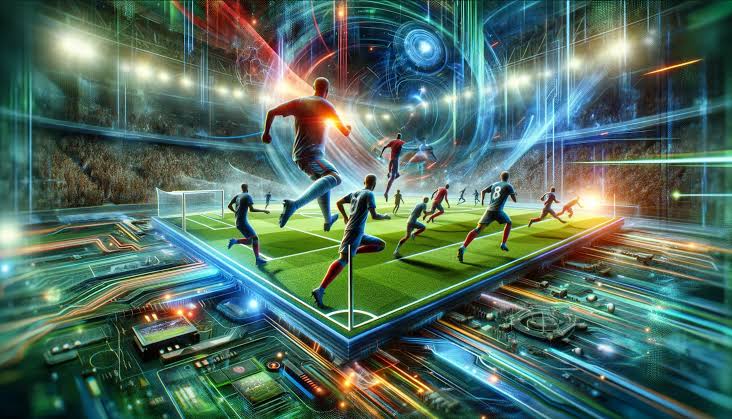
The Future of Football and the Implications of Emerging Technologies Like Virtual Reality and Esports.
Football, often referred to as “the beautiful game,” has a rich history and deep cultural significance worldwide. However, like many traditional sports, football is evolving.
The sport’s future promises to be heavily influenced by emerging technologies, particularly Virtual Reality (VR) and Esports.
These advancements are not only altering how the game is played and consumed but are also opening up new opportunities for fan engagement, training, broadcasting, and competition.
1. Virtual Reality and Immersive Fan Experiences

Virtual Reality (VR) is set to revolutionize the way football is experienced, both for players and fans.
Traditionally, football fans have relied on television broadcasts, live stadium attendance, or radio commentary to follow matches.
While these mediums remain popular, VR is poised to create a new dimension of immersion, offering fans unprecedented access to the game from angles they’ve never experienced before.
a. VR Broadcasting and Match Viewing
VR technology allows fans to experience matches from the perspective of players, referees, or even specific angles in the stadium.
By wearing VR headsets, fans can feel as though they are on the pitch, following the action from a first-person perspective.
Broadcasters and football clubs are increasingly experimenting with VR content to offer fans a more interactive viewing experience, and this trend is expected to grow.
For instance, the English Premier League (EPL) and Spain’s La Liga have explored the potential of VR broadcasts, creating a more dynamic way for fans to engage with the game.
Fans can choose their perspective during a live match and immerse themselves in 360-degree environments that replicate the stadium atmosphere.
This type of immersive experience is particularly appealing to younger generations, who crave interactivity and novelty in entertainment.
b. Enhanced Fan Engagement
Beyond live matches, VR can provide fans with virtual tours of stadiums, behind-the-scenes access, and interactive fan zones.
For example, fans could use VR headsets to take virtual tours of legendary stadiums like Old Trafford or the Santiago Bernabéu without ever leaving their homes.
These experiences can be further enriched with augmented reality (AR), where digital elements such as statistics, trivia, or historical moments are layered onto the real-world environment.
As football becomes more global, VR will play a critical role in connecting fans from different corners of the world to the stadium experience, increasing fan engagement and loyalty to clubs and players.
2. The Growth of Esports and Virtual Football Leagues

In parallel to traditional football, Esports has become one of the fastest-growing sectors of the gaming industry, and its influence on football is becoming more pronounced.
Esports football leagues, such as the FIFA eWorld Cup and ePremier League, have gained traction, drawing millions of viewers and participants from around the world.
a. FIFA and Esports Integration
The FIFA video game franchise by EA Sports has long been a staple for football fans, but recent years have seen it evolve into a competitive platform that mirrors real-life football leagues.
Top clubs now have dedicated Esports teams that participate in virtual tournaments, with professional Esports players competing for substantial prize pools.
This fusion of football and gaming provides a unique avenue for fan engagement.
Younger generations, who grew up with gaming as part of their daily routine, are drawn to Esports events that offer a blend of competition, entertainment, and real-time interaction with their favorite football clubs and players.
Football leagues and teams are increasingly recognizing the importance of Esports in maintaining their relevance among digital-savvy audiences. By embracing Esports, football is tapping into a massive, younger demographic that views digital competitions as equally engaging as physical sports.
b. Virtual Football Leagues and Fan Participation
The rise of Esports football leagues isn’t just limited to professionals. Amateur players can now participate in virtual tournaments that run parallel to real-world football leagues.
This democratization of participation allows fans to experience the thrill of competition, compete for rankings, and represent their favorite clubs in the digital world.
In the future, we can expect to see more integration between real-world football and its virtual counterpart.
Football leagues may create hybrid tournaments that combine real matches with virtual competitions, offering fans multiple ways to engage with the sport. For example, a major football final could be mirrored by a virtual final, with both events happening concurrently, creating a truly interconnected experience.
Read Also: The Impact Of VAR Technology On Referee Decisions: Revolutionizing Football
3. Technological Enhancements in Player Training and Performance

Beyond the fan experience, emerging technologies are also transforming how football players train and improve their performance. From VR to data analytics, football clubs are investing in technology to gain a competitive edge.
a. VR Training Simulations
Virtual Reality is being used by professional clubs to enhance player training. With VR, players can simulate match conditions, practice decision-making in real-time, and experience various in-game scenarios without the physical toll of on-field training.
VR headsets can transport players into high-pressure match environments, allowing them to practice their reactions and strategies in a safe, controlled setting.
For example, goalkeepers can use VR to simulate penalty shootouts, while outfield players can practice set pieces and positioning.
The immersive nature of VR makes it possible for players to develop muscle memory and sharpen their tactical awareness without the fatigue associated with traditional training methods.
b. Data-Driven Performance Analysis
Alongside VR, advanced data analytics is playing an increasingly important role in football.
Wearable sensors, smart cameras, and AI-powered software are used to track every movement of a player on the pitch, offering insights into their physical performance, tactical positioning, and decision-making.
This data can be fed into VR systems to create personalized training programs tailored to individual players’ strengths and weaknesses.
Coaches can use this information to make data-driven decisions on tactics, substitutions, and training routines, further optimizing team performance.
4. The Role of Artificial Intelligence and Automation in Football
As AI technology continues to evolve, its role in football is expanding. From player scouting to match analysis, AI is becoming a key tool in football management.
a. AI for Scouting and Recruitment
AI-powered platforms can analyze vast amounts of data on players from around the world, helping clubs identify hidden talent and make informed recruitment decisions.
This can include analyzing player statistics, match performances, injury history, and even personality traits to assess their potential fit with a team’s style of play.
AI also helps clubs reduce the risk associated with transfers by offering predictive analytics on how a player will adapt to a new league or system. For example, AI can simulate how a player’s style would translate from La Liga to the Premier League, offering clubs deeper insights before making costly decisions.
b. Automated Refereeing and VAR Systems
Technology has already made its way onto the pitch through the introduction of VAR (Video Assistant Referee), but automation in refereeing is likely to increase.
In the future, AI could take on a greater role in decision-making during matches, assisting referees in making quicker, more accurate judgments.
For example, AI-driven systems could instantly detect offside calls, fouls, or handballs with minimal delay, reducing the controversy and human error associated with traditional refereeing.
This would make the game faster and more transparent while maintaining the integrity of the sport.
5. A Technological Revolution in Football

The future of football is set to be transformed by emerging technologies like Virtual Reality and Esports.
These innovations are not only enhancing fan experiences but are also changing the way players train, how teams are managed, and how the game is officiated.
As technology continues to evolve, football will remain a sport rooted in tradition while embracing new opportunities for growth and engagement.
Whether through immersive VR broadcasts, Esports competitions, or data-driven performance analysis, the beautiful game is entering a new era of technological sophistication that will redefine its future for generations to come.



